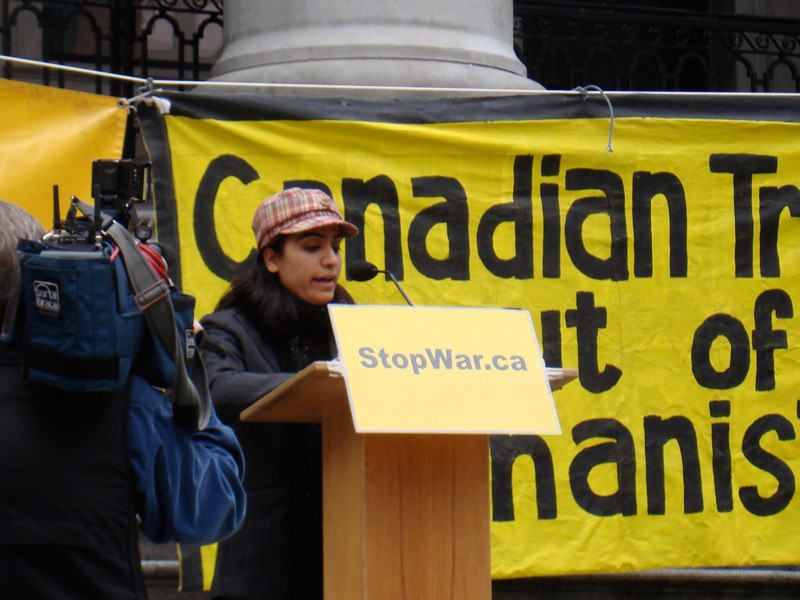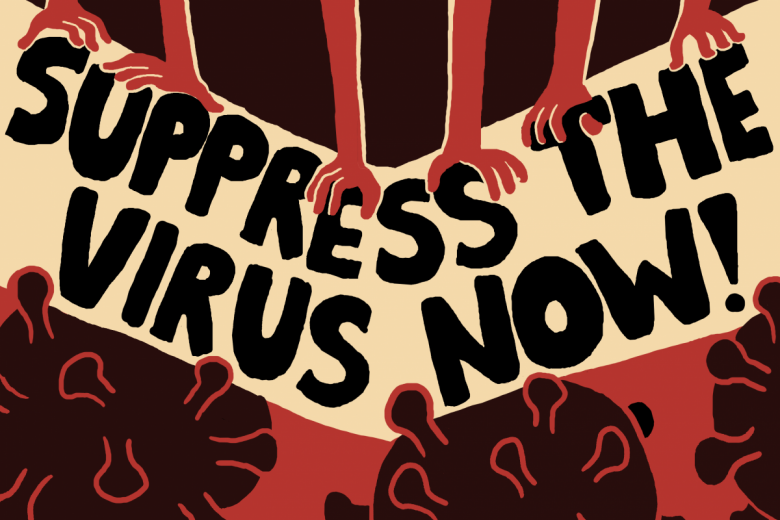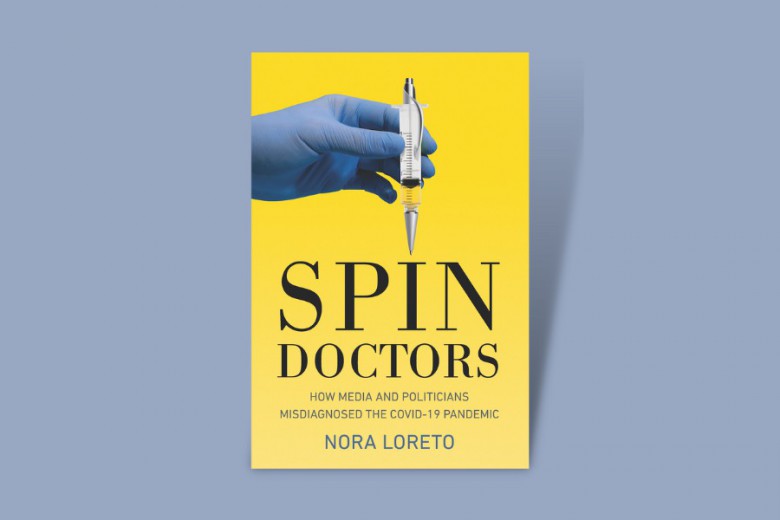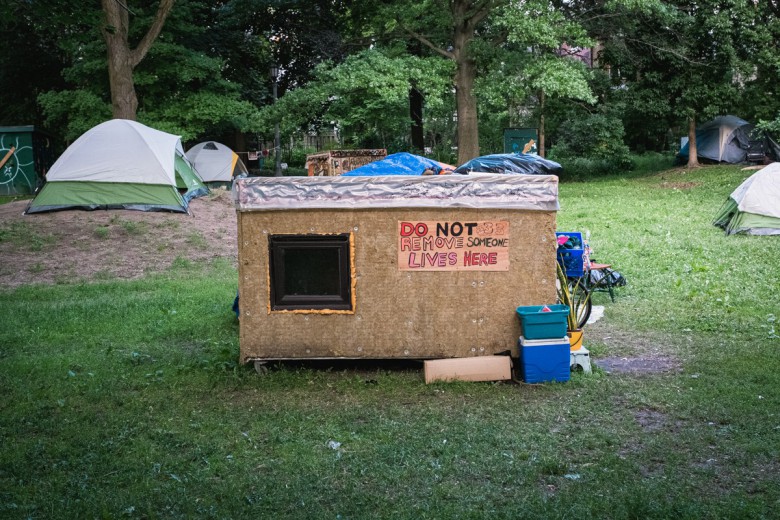
Malalai Joya, 29, is a popular women’s rights activist and an outspoken critic of the government of Hamid Karzai and the Northern Alliance. Elected in 2003 and 2005 as the youngest member of Afghanistan’s parliament, she runs the Hamoon Clinic in Farah province—the only health care centre in the area that offers free services, including medication, to its patients, who are mainly women and children.
Joya became famous in 2003 when, in her first speech to Afghanistan’s loya jirga (constituent assembly) as a newly elected MP, she denounced the presence of warlords and druglords in that body. At the invitation of the group B.C. Labour Against War, Joya toured Canada in November 2007 to bring attention to the dire condition of women in her country, as well as to protest her expulsion from Afghanistan’s parliament in May 2007. I spoke to her in Toronto.
One of the reasons the Canadian government uses to justify its invasion and occupation of Afghanistan is the protection of women’s rights from the fundamentalist Taliban. According to Joya, however, the Karzai government is as fundamentalist as the Taliban and treats women just as brutally. Joya denounces the Karzai government and parliament as a corrupt regime of warlords and druglords who are guilty of many war crimes.
Asad Ismi: On May 21, 2007, you were expelled from the Afghan parliament. Why?
Malalai Joya: Because of comments I made during a television interview. I criticized the parliament for failing to accomplish enough for the Afghan people, saying, “A stable or a zoo is better. At least there you have a donkey that carries a load and a cow that provides milk. This parliament is worse than a stable or a zoo.”
My specific crime was “insulting the institution of parliament.” My expulsion is illegal, a restriction of free speech, and clearly shows that this is an undemocratic parliament. Today in Afghanistan, we have jungle law because of these Northern Alliance fundamentalists. Human Rights Watch has called for my immediate reinstatement and pointed out that members of the country’s parliament have regularly criticized each other, but no one else has been suspended.
How else have you been attacked?
Since my election in 2003, I’ve been targeted by the criminals and drug smugglers in parliament because of my efforts to fight for women’s rights. There have been four assassination attempts on my life, my house has been blown up, and I have to travel with bodyguards. In the parliament, I have been assaulted and my life has been threatened, with one of the members even saying, “We have to kill her by any means, even a suicide attack.” I’ve also been threatened with rape and called a prostitute. The microphone has been turned off during my speeches.
Who are the druglords in the government?
According to the media, at least three important ministers—Karim Khalili, Arif Noorzai, and Ismail Khan—are well-known druglords. Most of the people who control the Northern Alliance, which runs the government, are druglords. According to Human Rights Watch, 80 per cent of the members of the Afghan parliament are warlords, druglords, and criminals. The druglords are ministers, governors, commanders, MPs, and ambassadors. Karzai continues to put these criminals in high official posts and the Afghan people are hostages in their hands.
To give you one example: Izatullah Wasifi is an Afghan druglord who was jailed in the U.S. for selling heroin in Las Vegas. After his release, he returned to Afghanistan where Karzai made him governor of Farah province. In this post, Wasifi engaged in drug trafficking and corruption, and for this Karzai made him head of the government’s anti-corruption body in 34 provinces of Afghanistan—quite a promotion. This is why Afghanistan is the biggest producer of opium in the world today, supplying 93 per cent of the world supply. While the drug dealers running the country enrich themselves, only a mere two per cent of the Afghan people have access to electricity, and 60 per cent of them live below the poverty line.
Do Afghans support the Karzai government?
Most Afghans do not support this warlord, druglord government. In the parliamentary elections, most people did not vote because they wanted to show their anger at the results of the earlier presidential election. A March 2007 survey conducted by Integrity Watch Afghanistan revealed that 60 per cent of Afghans think that the current administration is more corrupt than any other in the past two decades. The people know that as long as the Northern Alliance is in power, there is no hope for positive social change. The main backers of Karzai and the Northern Alliance are, of course, the U.S., Canada, and other Western countries that are supporting a government of drug dealers and criminals. Canada is following U.S. policy, which makes a mockery out of democracy.
Do you think the position of women in Afghan society is much worse under Karzai than before?
Yes, their position is catastrophic. The Northern Alliance government is made up of fundamentalists, just as the Taliban were, and they oppress women in horrendous ways. Women still cannot get educated today, their movements continue to be restricted, and they have very few employment opportunities. As a result, suicides by women in Afghanistan are more numerous today than ever before. According to official figures, 250 female suicides were reported in just the first six months of 2007. Sumaya, an 18-year-old, hanged herself because she was to be sold to a 60-year-old man. In Herat province, 104 women burned themselves in the Central Hospital.
According to an official survey, 80 per cent of marriages in Afghanistan are forced, and 95 per cent of women in the country suffer from depression. Every 28 minutes, a woman dies during childbirth. Life expectancy for Afghan women is only 45 years. According to Oxfam, a mere .05 per cent of girls are enrolled in secondary education, and just 20 per cent are in primary schools.
The Northern Alliance warlords who today control much of Afghanistan kidnap girls and women and rape them regularly. The shocking news of Sorava, 11 years old, in Kunduz province is enough to tell you about what is really happening to women in Afghanistan. She was the only daughter of an unfortunate widow; the local Northern Alliance warlords kidnapped her, raped her, and then exchanged her for a dog. There are many examples like this.
Should Canada withdraw its military forces from Afghanistan?
Foreign invasion is not a solution for the disastrous situation of Afghanistan. As our history demonstrates, we don’t want occupation. Six years of Western military occupation clearly show that these armies have not come to provide us with security. The U.S. and its allies, including Canada, are supporting the sworn enemies of our people. If they continue this wrong policy, one day they will be faced with the massive resistance of our people, as our history shows.
The Afghan people today are sandwiched between the Northern Alliance government, which is made up of pro-U.S. terrorists, and the Taliban, who are anti-U.S. terrorists; Afghans want to be ruled by neither. My main message to the Canadian people is to please support the democratic-minded people of Afghanistan and pressure your government to end its support for the fundamentalist Karzai regime, which is a photocopy of the Taliban. Most of the money from the international community is going into the pockets of this corrupt government. We need the material support of Canadians for health and education in Afghanistan, not for the warlords, druglords, and criminals. This is especially important for improving the position of women and children, who are the main victims of the war. Canada needs to act independently and not blindly follow U.S. policy.
We don’t just want the withdrawal of Canadian and other foreign troops from our country. We also want the fundamentalists of both the Northern Alliance and the Taliban to be deprived of their power and resources. The possibility of a civil war happening once foreign troops leave Afghanistan can be minimized by the international community pressuring Pakistan, Iran, Uzbekistan, and others who support either the Taliban or the Northern Alliance, not to do so.
Are there progressive forces in Afghanistan that could take over if the Taliban and the Northern Alliance were not there?
Yes. We don’t have only fundamentalists in Afghanistan; we also have a lot of democratic-minded people and parties. If I’m still alive today, it’s because many, many people supported me and voted for me twice, in 2003 and 2005. Today, through OPAWC (the Organization for Promoting Afghan Women’s Capabilities), the non-governmental organization of which I am Director, we are promoting the social advancement of women. We’ve had health and education initiatives since the Taliban period in 1998 and we are still working inside Afghanistan.
The Revolutionary Association of the Women of Afghanistan is another women’s political organization that’s been fighting against fundamentalists in Afghanistan for more than 30 years. Their leader has been killed and the lives of their members are regularly threatened. We have democratic parties as well, but they are very weak. They can’t publish their magazines due to lack of money.
I believe that, with the right kind of international solidarity, the Afghan people can defeat the warlords and druglords ruining their country. As Bertolt Brecht said, “Those who struggle may fail, but those who do not struggle have already failed.”
Asad Ismi has written extensively on U.S. policy towards Afghanistan. He is the author of the radio documentary The Ravaging of Africa, which investigates the destructive impact of U.S. imperialism on the continent. This article was originally published in the CCPA Monitor.


_780_520_90_s_c1.jpg)



